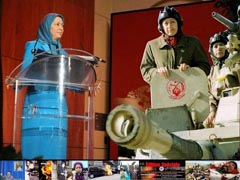The decision of the US State Department to remove the Mujahedin Khalq Organization (MKO) from its list of foreign terrorist organizations created an atmosphere of ambivalence particularly in  the West. Public opinion in the West may face contradictory ideas regarding the decision. On the one hand well-paid supporters of the group view the decision as “correct” but “overdue” ,on the other hand, there are experts and journalists and of course Iranians who view it as an evidence of American double standards and hypocrisy.
the West. Public opinion in the West may face contradictory ideas regarding the decision. On the one hand well-paid supporters of the group view the decision as “correct” but “overdue” ,on the other hand, there are experts and journalists and of course Iranians who view it as an evidence of American double standards and hypocrisy.
Regardless what people –pros or cons –may think of the apparent reality: a group is no more considered “terrorist”, the true substance of the MKO as well as many other cult-like groups does not change. In the world of “legal” or “illegal”, “bad” or “good”, “terrorist” and “freedom fighters”, conventions never tell the truth.
Even in the Press Release of the spokesperson’s office of the DOS, you may see the ambivalence in the published decision:”With today’s actions, the Department does not overlook or forget the MEK’s past acts of terrorism, including its involvement in the listing of US citizens and an attack on US soil in 1992. The Department also has serious concerns about the MEK as an organization, particularly with regard to allegations of abuse committed against its own members.”[1]
While the DOS says”Yes” to the MKO, there is a “No” in the background informing its decision. It seems that the US government is not able to fully commit to that “Yes”. This was also implied in comments of a US official who spoke to Barbara Slavin and Laura Rozen of Al-Monitor on condition of anonymity. They wrote in their piece titled” Iran Group MEK’s Delisting Does not Signal US Approval, ”The US official added that taking the MEK off the terrorist list would not connote US government approval. Responsible for the deaths of half a dozen Americans in the 1970’s and for killing hundreds of Iranians after 1979, the MEK is widely regarded as a cult that demands that its followers stay celibate and obey the commands of Mariam Rajavi, the wife of MEK leader Massoud Rajavi, whose whereabouts are unknown.”[2]
Another US official assured Elise Labott who first published the news of delisting on CNN, that US government is concerned about the group’s bad reputation. “While they represent themselves as a legitimate democratic group worthy of support, there is universal belief in the administration that they are a cult”, the official told CNN.”A delisting is a sign of support or amnesia on our part as to what they have done and it does not mean we have suddenly changed our mind about their current behavior. We don’t forget who they were and we don’t think they are now who they claim to be, which is alternative to the current regime.”[3]
One of the authors of the famous RAND report on the MKO, published in 2009, is Christina Wilkie who is also a Huffington Post correspondent. She has a different analysis on the group delisting. As she has widely investigated on the MKO and as she says she’s been reporting on the group for the Huffington Post, she has been threatened by members of the group and her email was hacked by them. However, she believes that the DOS’s “decision was a good one.” She makes it clear that she believes the MKO is a “militant cult of personality” and she doesn’t trust them but Clinton delisted them because she “understands that they’re a dangerous cult, and that all the other potential outcomes of the 30-year standoff between the MEK and the outside world would have likely been much, much worse.”[4]
Wilkie thinks that on top the list of risky MKO functions was mass suicide and to stop such a tragedy,” Clinton only had one major bargaining chip. In exchange for leaving Camp Ashraf, the secretary agreed to delist the group from the U.S. list of Foreign Terrorist Organizations,” this way she saved the lives of “ thousands of brainwashed MEK foot soldiers”.[5]
At least Wilkie admitts that the State Department officials feel some ambivalence about the terrorist substance of the cult of Rajavi: ”But the question facing secretary Clinton wasn’t whether the MEK could be trusted,” she writes. “Or even if the MEK’s members were still dangerous. Privately, US officials don’t pretend to know the answer to either one.”[6]
It seems that no pretext can ultimately enclose the dual approach of the US administration. In a Mint Press article, the author Martin Michaels describes the terror listing or delisting of Foreign Terrorist Organization as paradoxical. He refers to US administration’s decision to classify Wikileaks as the enemy of the State comparing the decision to that of delisting the MKO. He concludes, “The Selective branding of Wikileaks, the MEK or other organizations align with the interests of the US while the MEK may share some of the same goals, namely, regime change in Iran, the labeling indicates an underlying desire to justify alliances in the name of security.”[7]
By Mazda Parsi
References:
[1] US Department of State, Delisting of the Mujahedin-e-Khalq, Office of Spokesperson, September 28, 2012
[2]Slavin, Barbara & Rozen, Laura, Iran Group MEK’s Delisting Doesn’t Signal US Approval, Al Monitor, Septemeber2, 2012
[3] Labott, Elise, Clinton to remove Iranian exile group from terror list, CNN, September 21, 2012
[4]Wilkie, Christina, MEK is Bad News, But Delisting Them Was A Good Decision, the Huffington Post, October 1, 2012
[5]ibid
[6]ibid
[7]Michaels, Martin, Wikileaks And The MEK: The Paradoxical Labeling Of Foreign Terrorist Organizations, Mint Press News, October 1, 2012

